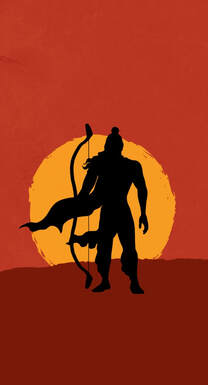 "I will send for many hunters." "I will send for many hunters." Fox hunting began in the 15th century in England. Men on horses with hounds scour fields for foxes in traditional “kit” or clothing. An upper-class pastime, it is not without controversy. There are huntsmen or huntswomen, kennelmen to look after the hounds, and terriermen to manage the foxes. As a non-hunter myself, I only bring up this style of hunting because it begins with an invitation from the master, who initiates the hunt and is responsible for its overall management and conduct. I like that imagery. In the gospels (Mark 1:16-18 and Matt 4:19), Jesus calls to brothers who are catching fish with nets. “Come, follow me, and I will make you fishers of men.” Simon-Peter and Andrew, smelly, sweaty, curious, and instantly obedient, do indeed follow Jesus. And every child knows from Sunday school that the men who caught fish for a living would now give their lives to “catch” people for Jesus. But there’s more to the story. There’s always more. Jesus didn’t arbitrarily choose that phrase, “fishers of men,” and Peter and Andrew weren’t random fishermen. Both the phrase and the profession were the fulfillment of a promise given by God centuries earlier. Did God really promise fishermen and fishers of men? He did. And being the Master of the Hunt, he promised hunters too. Jeremiah 16 is a gloomy, gleaming passage of scripture. It hurts and heals at the same time. Jeremiah the prophet writes of looming judgment for God’s beloved people. They have abandoned his love and his law and walked after, served, and bowed down to handmade idols. Their rejection of God will lead to God’s rejection of them. And yet, even in the cauterizing warning is covenant promise. Because after God hurls them out, God will gather them back in. The nation whose deliverance from slavery in Egypt was so foundational to their identity that it was celebrated every year and told to generations would one day change, Jeremiah said. Instead of being known as the nation God brought out from Egypt, they would become the nation God gathered from the globe. Whoa. And how would God collect his people from “the land of the north and from all the countries He had driven them?” You guessed it. He would fish for them, and he would hunt for them. As the Master, he would deploy his fleet of followers over land and sea to hunt and fish for covenant souls who had been scattered far and wide. “Behold, I will send for many fishermen,” says the LORD, “and they will fish for them, and afterward I will send for many hunters, and they will hunt them from every mountain, hill and out of the cleft of the rocks…” (Jeremiah 16:16) So now Peter and Andrew being fishermen who became fishers of men hopefully has more significance. Jesus was bringing about what His Father had already told Jeremiah He planned to do. And guess what? The hunt continues. Those who profess Christ are called to hunt for others who are part of the family but don’t know it yet. Not in a predatory sense (I’m going to take your life) but in a sacrificial sense (I’ll give my life for your restoration.) So there you have it. Follow Jesus, the great Master of Hunt, and get your very own fish story.
0 Comments
 I’ve been listening to how people describe themselves. I’m noticing how I describe myself too. In different contexts this week, I’ve been grateful and exhausted, nervous, excited, fearful, irritated, and hopeful. I haven’t once described myself as confident. Maybe that’s because I’m a woman who isn’t supposed to be. Or maybe, as a Christian, I don’t want to sound arrogant. Or maybe it’s because I’m an ethnic minority, an immigrant, or just insecure. Or perhaps it has something to do with my faith. There is a boldness to the Christian walk and boasting in our faith. A confident assurance that’ll have us selling all we own (Matthew 13:44), ditching lucrative careers (Mark 2:14), and knowing the impossible is possible with God (Luke 1:37). Are you a biblical boaster? We should be. But those who wish to boast should boast in this alone: that they truly know me and understand that I am the LORD who demonstrates unfailing love and who brings justice and righteousness to the earth and that I delight in these things. I, the LORD, have spoken! (Jeremiah 9:24) The prophet is writing, but it’s God speaking. Don’t boast in your wisdom, wise man. And you mighty man, don’t boast in your strength. Rich man—don’t you dare boast of your wealth. Boasting is good; only when you boast of me that you understand and know who I Am. And who am I? I am the LORD who practices steadfast love, justice, and righteousness on the earth, for I delight in these things. But you might say, boast has such an ugly connotation in the English language. It means praising oneself extravagantly in speech and speaking of oneself with excessive pride. Yes, it’s icky if you or I boast in ourselves, but is there any language on the planet, any words in any language adequate to express the wonder and mysteries of our God? Not only do our lips struggle to boast of God, but language itself buckles under the glorious weight of his name. But God still wants us to give it a try. “Turn to me and be saved, all the ends of the earth. For I am God, and there is none besides me. ‘Only in Yahweh,’ one shall say to me, ‘are righteousness and strength.’ In Yahweh, all the offspring of Israel shall be in the right, and they shall boast.” (Isaiah 45:22, 24-25) I went to Psalm 27 for the ending—because I wanted to remind myself that I would see the goodness of the Lord in my life—but I stopped at the beginning because David said the words I couldn’t. Yet, I will be confident. (Psalm 27:3) Boasting and confidence are linked. Intimacy with God is the basis for our biblical boast. But we can’t boast about a God we don’t know. So boasting is also linked to faith and, ultimately, the regenerating work of God’s Spirit, who calls us to an awareness of glory. Before we can boast in the Lord, we must know him. Know him. Not know of him or cool facts about him, but actually know him. And as we grow in this holy relationship, our boasting will increase. We’ll hear it in our prayers and see it reflected in our lives. This is how I determined my lack of confidence in the Lord isn’t mainly due to my baggage but a lack of faith. When I know who he is, my mouth will open in praise. Intimacy with God makes me brave. Confidence in Action It’s the David of Goliath fame who’s writing Psalm 27. He’s past his glory days as a child giant-slayer and has been slain a few times by his sin. Testing and affliction have come to him as fire to burn away arrogance and confidence in personal wisdom, might, and wealth. And so, he takes ink to scroll and boasts in the LORD. The LORD is my light and my salvation; whom shall I fear? The LORD is the stronghold of my life; of whom shall I be afraid? (Psalm 27:1) Who are these adversaries that don’t frighten King David because the LORD is his light and salvation? They are flesh-eating evildoers (27:2). An enemy army encamped around him, set on bringing trouble (27:3, 5). David isn’t using hyperbole or speaking romantically. He’s acknowledging real evil. Armies determined to bring war and death have surrounded him. The predator is waiting, planning. In David’s day, this spoke of enemy nations of the earth and demonic antagonists working behind the scenes. Evil is physical and spiritual. For David, a time of trouble was a time to boast in the LORD. According to the New Bible Commentary, this psalm shows faith is sufficient when enemies become armies and enmity, open warfare. That’s faith! But to boast like that about God, we’ve got to take the time to know him deeply. With the grace extended to us from on high, we’ve got to do the soul work. We’ve got to get in the Word and let the Word get in us. We’ve got to listen to the still, small voice of God’s Spirit and walk by faith. We should feel the conviction of personal sin (not merely judging others for theirs) and move to repentance. We need to talk with God and listen to God in prayer. We’ve got to love the world with the love of God. As Christians, we can pray what’s on our hearts but let our prayers move from soggy suitcases of doubt, insecurity, and demands to tactical rucksacks designed to survive the apocalypse. Learn who God is by reading his Word (the Bible) and getting near his people (the Church). Pray big. Pray boldly. Wait. Weep. Lament. Repent. Be silent. But please, stop whining. This world isn’t Disneyland, and prayers aren’t wishes. They are powerful, source-direct words by faith that transport us beyond the confines of earth and into the heavenly throne room of a gracious God. Learn who he is. Accept by faith who you are in him. Boast about that. And you will say, like David, when darkness encircles you, “yet, I will be confident.” Finish Well, Dionne 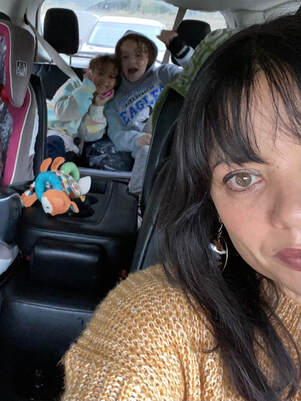 Off we go! Off we go! Ever had a moment when you need to know if the Bible is true? I don't mean vintage morality, quotable Christian platitudes or even epic doctrine you’ve window-shopped but never tried on. I mean, truth in scripture that’ll bear your weight when you stand on it. A fact of God, that’ll keep you afloat in a deluge of doubt. A new reality that you perceive but can’t quite grasp, yet treasure like a billionaire’s signed check. You don’t have the money yet, but it’s coming, and it’ll change everything. We know we ought to live by faith (Romans 1:17, Galatians 3:11, Hebrews 10:38), but often we don’t. We live by pseudo-faith. Praying for God’s will (that’s actually our own), denying the denying of self (because crosses suck), and putting our trust in whatever power we have access to. Some examples are youth, health, our partner or friends, education, wealth, substances, beauty, good deeds, and distraction. Blah, blah, blah. Human nature is so cliché. I know this is true about you because I know this is true about me. Because the Bible wouldn’t have to repeat this message if it were natural to us. Hebrews 11:6 says it's impossible to please God without faith and I'll add it's impossible to live by faith without holy help. Did Paul Throw Me a Life Preserver, Or Am I Going to Drown? So, I’m having a hard time. My kids (there are seven) are sick, and it feels like I’m at the doctor’s office or urgent care or the ER frequently addressing this. And some kids are up at night (can we abolish the ‘sleeping like a baby’ idiom? Babies don’t sleep all that well.) My little kids NEED ME RIGHT NOW. They are whiny and snotty and need diaper changes. My teenagers need me, too, in big and complex ways. The laundry is piling up. Everyone is STARVING. The dog threw up. The cat got out. The van needs gas. And I’m exhausted. My prayers are smoke signals. My water bottle of faith is down to the dregs. And I need to know, like, really know, if Paul (the author of Romans and much of the New Testament) is telling me God’s truth or Hallmarking me. Keep your sermons and hashtags. Keep your pretty out-of-context scripture verses and your Pollyanna interpretations of purpose. I’m not looking for cute Christianity, rainbows or unicorns, a palm tree on a beach or even a shoulder to cry on. I need power. I need hope. Paul writes: And not only this, but [with joy] let us exult in our sufferings and rejoice in our hardships, knowing that hardship (distress, pressure, trouble) produces patient endurance; and endurance, proven character (spiritual maturity); and proven character, hope and confident assurance [of eternal salvation]. Such hope [in God’s promises] never disappoints us, because God’s love has been abundantly poured out within our hearts through the Holy Spirit who was given to us. (Romans 5:3-5, Amplified) Paul, Are You Telling the Truth? Right before this, he writes that I’ve been justified by faith and have peace with God through Christ. In addition to peace with God, which is incredible, I also have access by faith to grace. Faith --->Peace with God Faith ---> Access to grace Pseudo-faith gives false security and a random seat in the nosebleed section. Real faith sweeps you through the crowd and into the throne room of grace. Grace. Charis. It means joy, pleasure, and delight. Another helping of the Helper, my helper, the Holy Spirit who pours God’s creating, sustaining, transforming love into my heart. There’s the billionaire’s signed check. The eternal promise. And faith is the bank, where the words become wealth. Not only do I have peace with God and access to grace by faith, but Paul says this peace and access, which ultimately leads to an invincible hope, should cause me to rejoice and exult EVEN IN my trials. For real, though? Am I supposed to rejoice over the mommy slog of my life? Am I to exult in diaper changes and diagnoses and fatigue and mismatched socks? Exult is a verb, from Latin’s exsultare. It means to “leap up.” Rejoice is Old French, rejoiss. It means to experience joy with force (that’s what the prefix ‘re’ means.) How am I supposed to leap up and have forceful joy in this enduring situation? Clearly, Paul didn’t have seven kids! But he was beaten frequently. Shipwrecked, hungry. Lonely, imprisoned. He was called names and delivered in chains. And when he wasn’t sleeping on a cold stone floor behind bars, he didn’t have a spouse and seven children to return to. Lord, forgive me for complaining, and thank you for sustaining. This family, this life, is life. And I can do all things through you. I've Got the Power Here's the thing. I'm not an apostle like Paul who has had epic visions and whose writing credits include the Bible. I'm not a theologian, scholar, pastor or anything super churchy. I’m a mom. I've got children who are biological, adopted and who have been entrusted to me through foster care. I live on mission. Which is to say, I live with a limp. And that's why I had to sit long with Paul's words. As my grandmother would say, "I needed to be propped up, on my leanin' side." Paul and I do have something in common though: peace with God and access by faith to grace. We've both got the Holy Spirit--all believers do. Salvation is our hope, eternal security is our promise. God showed his love for us by sending his son to die on our behalf, while we were still sinners. How much more peace, access, grace can we expect now that we're justified? Faith is the Key It’s not our trials per se that get us jumping for joy (crosses do suck), but the hope in God, the revelation of Christ, that the trials initiate, that should get us geeked. We rejoice in sufferings, not because they’re cool, but because God is. Our hardships, big and small, ignite the fuse of faith, producing endurance (faithfulness over time) and proven character (integrity, spiritual maturity) that leads to hope. Hope for eternity and hope for today. Because if God has already taken care of the biggest thing, he is faithful to see to the smaller things. This is not an insecure hope, as in, “I hope this works out” or in my case, "I hope Paul's words are true." Oh, no. This is a joyful expectation of eternal salvation. As C. S. Lewis said, "Aim at heaven and you get earth thrown in, aim at earth and you get neither." It’s as though heaven's chalice has been dipped into the everlasting, overflowing reservoir of God’s love and poured from beyond the stars into the prepared human heart. A heart prepared for grace, charis, by trouble. No distress, no affliction, no trouble—no infusion of heavenly grace, no endurance, no proven character. No hope. No hope! So, at least from Romans 5, an ingredient of temporal and eternal hope is some form of affliction, trouble, or distress. And here I am, thinking my enduring challenges mean God is distant. Instead, it’s actual proof that he’s right here with me. The believers’ hardships are proof of God’s closeness, not his distance. That makes me smile big and jump a little. Finish Well, Dionne 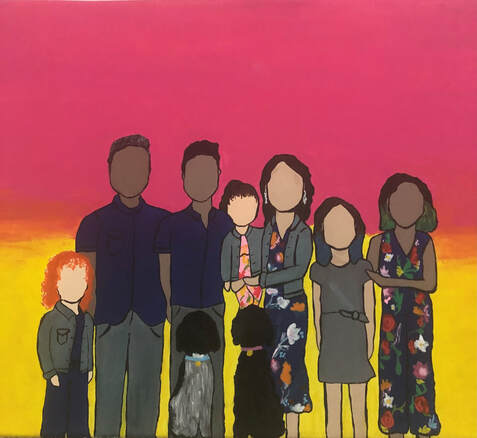 "My Sunset Family" painted by Kai Joseph "My Sunset Family" painted by Kai Joseph I've heard a lot of people contemplate fostering. Their excuses are always something along the lines of, I don't want to get attached or I just wouldn't want to let them go. What they seem to not realize is that foster care isn't about them, it's about children who have been stripped of the one environment they know. Although this job is based around the child, it will benefit the caregivers. Foster care is grueling, emotional, and overall just a huge bumpy roller coaster, yet it's such a beautiful thing no matter the outcome. Foster care has made me into a better sister, friend, and has prepared me so much for adulthood. I became a foster sister around the age of 10. It started with my mom asking how I would feel to share my home with another kid. My mother would always say I was the second mom of the house and I've always known myself to be a fairly kind person. Knowing I would be helping a family in need was all the convincing I required. My family grew quickly within a couple of years. We went from being an average family, two parents and three kids, to a rotating roster of kids every year. Due to starting this process at such a young age, foster care has shaped me into the person I am today. It's a known fact that kids are not a fan of sharing. Things like toys, food and their bedroom feel sacred---but imagine how difficult it is for kids to share their parents' love. Now, I'm one of the oldest in my family, so I've had that experience. I know how it feels to not be my parents' sole focus, and I'm okay with that. My sister, on the other hand, had some issues. It probably didn't help that the first little girl we took in was four days older than her. I could see the jealousy radiating off of my sister. She struggled because for the first time she wasn't the main character. We all coped in different ways so I can't speak on her behalf. I personally enjoyed having another sister around. She was quiet, reserved and incredibly sweet. We would dance to loud music or laugh about nonsense. I remember celebrating holidays with her. The joy that lit up her face when opening Christmas gifts, blowing out candles on her very own cake, or dyeing Easter eggs rainbow colors are memories I'll treasure. The small gifts are what counts. It showed me the common blessings in my life could become a brand new experience for someone else. In a way, it allowed me to relive the excitement. It would be golden if each foster child arrived with their own personal guidebook with all their loves and hates, their favorite TV characters, or even a description of their personality, but each and every kid is different, and they can't be parented the same. The first little girl I talked about, returned to her mom after living with us for eleven months. My mother would wait and wonder who would come next. I did too! We had a few weeks of just being a regular family again, until we got the call that changed everything. There was a big age difference from Lulu* to our next child, Kira.* Lulu was seven years old when she lived with us, but Kira was only three. Her hair was like red fire ringlets and her skin, pale like freshly fallen snow. She had a couple freckles scattered across her cheeks. My mom used to call them kisses from the sun. And if there was one kid to be kissed by the sun it would be her! She embodied the sun inside and out. From her outward appearance to her bold personality. She made herself known wherever she went. We learned to adapt to her. We took notice of her loves and hates, her favorite shows, and grew to love her bold personality. We loved her with all our hearts. Then we got "the call" again, for Kira's little sister Tasha*, who was only 18 months old. Just like we adored Kira, we adored Tasha. She was our squishy bundle of joy! She had hair that bounced every which way and her giggles would echo throughout the house as she wobbled around. Having a baby in the house was even stranger than having a toddler. We had to sacrifice a lot for them. Our room that used to just be me and one of my sisters now occupied 4 girls. It was pure chaos. We all had to get our shots updated because Tasha was under two. Having really young siblings taught me the skill of caring for babies, and not all people are given that opportunity. By 5th grade I knew how to prep a bottle, hold a baby, put kids to sleep, and more. Our journey with them was very long and emotional. There was a lot of back and forth with their bio parents. I remember the week it was over. They were told to return to their biological family. They had been with us four years, and it matched the pain of ripping my beating heart from my chest and stomping on it. The pain I felt when I thought about them leaving was extreme and really hard to deal with. But low and behold their dad changed his mind and it ended with our whole family becoming one. We adopted them and our family became official. It's been almost 3 years since we adopted and we're still friends with their first parents. You would assume my parents would chill out on fostering kids and close their license, but nope. We have done foster care for infants across the board; some were just a couple months old. They all were incredibly unique. With one little girl we learned to see the beauty in Down Syndrome as well as how to feed a baby after heart surgery. She made my bad days good, and she has always stuck with me. I got very attached to her and I cried buckets when she went home. At the moment, we have the cutest kid! He's our teddy bear and he'll make your heart melt like ice cream on a hot day. When he lights up, his smile truly goes from ear to ear. These kids make the all the noise, responsibility and even dirty diapers all worth it. I know my mother is doing what she's been called to do and it makes me happy that I can assist her in any way, shape, or form. Often people who have had to parent siblings at such a young age will avoid having kids of their own, but not me. I watch my parents love and nurture children who aren't even their blood and that empowers me. Seeing the happiness they bring to these kids is great, but it's powerful to see the hospitality they extend to the bio parents as well. My mom and dad have always been loving people, they never wanted their bio kids to feel replaced. No matter how many kids came through our home, they never seemed to run out of love. They always have some stowed away. Seeing how selfless they can be encourages me to follow in their footsteps. I would love to one day have a safe space for kids to grow. Foster care will always be hard, but who doesn't like a good challenge? Having this be part of my story has made me think more deeply about others. I truly can't imagine where I would be if our family didn't take this path. I'm 15 and have the skills of a new mother and the love of one, too. I have the mindset to give up my free time to watch these babies and I wouldn't change it for the world. *Names changed to protect privacy 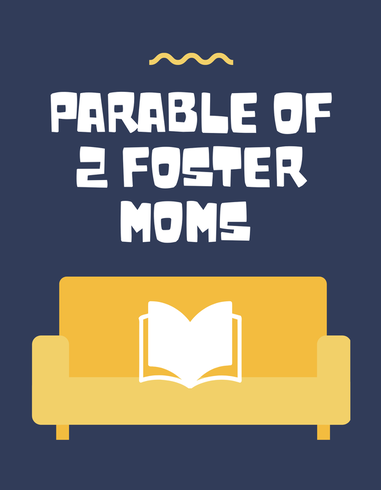 Once, two women desired to care for children in crisis. They decided the best way to help kids in their community was to become foster parents. The women were neighbors and shared their dreams. Since they had attended college together, got married within months of each other, and already had biological children about the same age, they thought it would be fun to participate in foster parent training together. Both women lived comfortable lives in a community of candy-colored homes. One volunteered at her child’s school; the other coached her child’s soccer team. One preferred take-out, and the other was a fabulous cook, and their families ate good meals every night. Twice yearly, both families enjoyed a holiday. One preferred the heat and sought out sunny beaches; the other family enjoyed history and turned vacations into learning opportunities. This is to say the women were very much alike. Or so it seemed. Eventually, they completed training, and each welcomed a child experiencing foster care into their home. It was a difficult adjustment for both women. Their new children had challenging behaviors, unique diets, learning styles and profound cultural differences. The roller coaster of emotions felt by both families was unsettling. Though both children had unique stories, the commonalities of dealing with the system, their child’s biological family, and the peculiarities of foster care drew the friends closer together. It was the most challenging experience either woman had faced, and in addition to encouraging one another, they each sought God. The first woman got up early and sat on her couch with her Bible and a devotional nearby. She prayed like this: Dear God, I thank you that I am not like the people whose children end up in foster care— neglectful addicts and abusers. I thank you that I had the wisdom to wait until I was married to have children and to wait until I was educated to get married! Thank you for keeping me from promiscuity and abortion. Thank you for giving me confidence and security, so I never developed an addiction. Thank you, Lord, for me, others like me, who give more than we take and set a righteous example for others to follow. Amen. She never got around to opening her Bible that morning, yet she got up from the couch feeling very good about herself. Across the street, the other woman also awoke early to seek God. She read a passage from the Gospel of Luke that wrecked her, and she knelt on the carpet before her open Bible. She was in anguish over the toll of sin and its extraordinary cost on humanity, but she was particularly grieved over the hardness in her own heart. She saw her pride—and despised it. She also knew about God’s grace and wept tears of joy that she received it. Oh, she was well aware of the deficits in her foster child's upbringing, and she grieved for the brokenness in the child’s biological family. But Ephesians 2:8 was engraved on her heart. It is by grace I have been saved through faith; it is a gift of God, not a result of works that I may boast. Since grace is a gift based on God's goodness and not human merit, it's accessible to all. She knew she didn't deserve this gift, yet still it was hers. This filled her with hope. There was much to do today. So many unmeetable needs. In her brokenness, with her limitations and blind spots—how could she do it all? Sinking into the carpet pile, eyes downcast and heavy with tears, she prayed: O God, be merciful to me, a sinner. She closed her Bible and got up, refreshed. She wasn’t confident in her abilities, past or present, but in God, she had no doubt. And at that very moment—angels above and around looked at each other with wide grins and then in reverence to their Master. Is that what you mean? His eyes sparkled. And he nodded. “I tell you, the second mother, not the first, is justified in my eyes. Remember, those who exalt themselves before me will be brought low, but those who humble themselves in my presence, I promise to exalt.” Inspo: Luke 18:9-14  Under the cover of night, Nicodemus, ruler of Jews, seeks answers from Jesus. He’s disturbed, perplexed. What he’s witnessing in Jesus is challenging what he thinks about God. Instead of ignoring the disconnect, he asks for clarification. “Rabbi, how can an old man be born again?” (John 3:4) It’s a question everyone who seeks to enter the kingdom of God must ask because only those born of water and Spirit gain entrance. “That which is born of the flesh is flesh,” Jesus says, that which is born of the Spirit is spirit.” In one sense, we have as much control over our new birth as our first birth. We didn’t choose our parents, birthday, ethnicity, or socioeconomic class. Jesus tells Nicodemus God’s Spirit blows like the wind, mysteriously, powerfully giving new life to whom he chooses. The breath of the Spirit isn’t easily seen, though it’s felt and heard, and its effects are apparent. The second birth doesn’t originate with man but God. In John 1:13, we learn those reborn receive the gift of salvation from above. It is God himself, who gives the children of man the right to become children of God. And yet, Jesus says response to this holy invitation is required. “As Moses lifted up the bronze snake on a pole in the wilderness, so the Son of Man must be lifted up, so everyone who believes in Him will have eternal life.” (John 3:14) Jesus reminds Nicodemus of an example from Numbers 21, where the children of Israel complained harshly against God and Moses, and snakes were sent to deliver fatal wounds. In peril, the people begged Moses to intercede, and God instructed Moses to make a bronze serpent, lift it high and tell those who wished to live to look upon it. All who looked—lived. It’s like that, Jesus says. I must be lifted up, and all who look toward me, believe in me, will live. Notice the connection between looking and believing, which is faith. Notice the parallel between belief and life. And profoundly, poignantly, contemplate what it means when Jesus says he’ll be lifted up--exalted—like the snake on the pole. How does the Father exalt the Son? By nailing Him to a raised, rugged cross, high on a mountain for all to see. The Father lifts up the Son by bringing him low. By willing He face rejection, abandonment, abuse, shame, torture, and murder so people like Nicodemus and you and me can be born again. Though Jew and Gentile united in the murder of God and rich and poor alike turned their backs on him, Isaiah reveals “it was the will the LORD to crush him; he has put him to grief.” (Isaiah 53:10) The mystery is profound, and so is the promise. Listen for the holy breeze and be it gentle or fierce, turn your face towards it, and live. 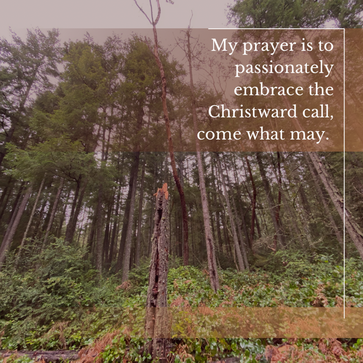 I had lived backward. No, not in a Benjamin Button way—born old and growing younger, but a very human, self-first way. My life was filled with good things: sound works and the fruit of that labor. A twenty-year-old marriage that was still new and children—five of them, unique and bright—gems in my crown. My house is safe and warm, a place of peace. We have a business. It is successful. We attend a church we love and have deep relationships there. Oh, life is good. And this isn’t a story of losing it all—but of finding a better way to have it all. I saw the fingerprint of God in my life but felt as though I was a holy disappointment. That I wasn’t walking in a manner worthy of my calling unless I was producing, and even then, it was too little, too late. I strove against my flesh, frustrated by my inability to do enough, well enough. Oh certainly, dear friends encouraged me. Rest, Dionne. Wait on the Lord. Work in the strength he supplies. But wasn’t I? As a woman set apart by God and a woman who deeply loves God, I am responsible and burdened to walk worthy. Instead of living set-apart lives, many Christians live mixed-in lives—one would be hard-pressed to discern their true allegiance—so I would make mine obvious. But now I saw I had lost my way too. I had gotten it wrong. I had lived backward instead of Christward. A Better Practice Once, I heard an online pastor say to live a life of honor, find someone who’s done it, and imitate them. He called it reverse engineering. So, if I sought a healthy marriage, find an older couple who had survived the peaks and valleys of fifty years and dissect their experiences to discern my next steps. In business, this is “best practices.” Find someone who’s done it well and replicate it. I think I did this. I lived this. It's a start but there's more--much more. Plans fail for lack of good counsel but succeed with many advisors (Proverbs 15:22), so there’s no doubt I can and should learn from others who’ve done it longer and did it well. But Paul didn’t merely instruct his audience to imitate him but to be imitators of him as he imitates Christ (I Corinthians 11:1). And it's not a marriage or business on the line here—but my soul. Eternity. This really matters. The key is Christ. Jesus is the key. It wasn’t best practices and reverse engineering that would carry me to the next level of living but Christ himself. Living toward him. A heart posture that has me leaning forward, leaning into the Divine Presence. It was falling into Jesus, even. Because getting it just right, probably doesn’t happen either. Because the path of obedience, of faithfulness, is a path of skinned knees and fumbled words. It’s a vertical and horizontal repentance journey—seeking forgiveness from God, asking forgiveness of others, and living forgiven by faith. Living whole in a broken world. It’s the cruciform life. We embrace the cross—its rugged ugliness and its perfect beauty because Jesus did. Not because we like pain or death but because we desire joy and life, and if we want Sunday’s resurrection, we must first pass-through Friday’s crucifixion. The Apostle John says Jesus is the Word (John 1:1) and the Light (John 1:9). The Word by which I hear. The Light by which I see. The Wordlight who gives life. It’s not mainly about living forward (progression, improvement, acquisition) or upward (growing in self-awareness, stature, building a more prominent platform or network) or onward (continuing, keeping up) but Christward. Jesus isn’t one way, but the way. He’s HPS, the heavenly positioning system. Follow me, he says. The secular world encourages passion, but do they know passion, from the Latin root pati means suffering? Compassion, compati means suffer with. Jesus, the Key of David, the always-existing Word, the Light of humanity, the Holy Way, suffers for us and with us, so we can “suffer with” one another. The Christward life is for the faint of heart. The proud and self-assured will never look for light in dirt, yet that’s where it is. The Christward life is marked by the things we assume must be eliminated before we can genuinely live, yet they are the passion promises. They beckon us to crucify self and all its idols—vain grabs for comfort, security, and status and trade them for Jesus. In Mere Christianity, C.S. Lewis said, “Aim at Heaven, and you will get earth ‘thrown in’; aim at earth, and you will get neither.” I want it all. The Christward life will call us to different spaces—and shouldn’t it? The world is overflowing with suffering--passion, in every corner on every continent. My prayer is to passionately embrace the Christward call, come what may. Diligence as I read and study my Bible. Faithfulness in gathering with others. Obedience in my activities. Repentance. Stillness in the Divine Presence. And bloody knees when I’m pressed into the dirt, searching for light. Finish Well, Dionne  They spoke of a kingdom of magic. Where adults become children again and princesses abound. Where a majestic candy-colored castle sits amidst a fantasy land, where laughter abounds and dreams do come true. The citizens of this kingdom come from all over the world, called, beckoned by the promise of delight, the tug of nostalgia. They wait in line for entrance and surrender many “rights” granted by inferior kingdoms (no weapons, no wagons, no-selfie sticks!) They relinquish privacy and are photographed, tracked, corralled. They don the regalia—ceremonial mouse-eared headpieces, t-shirts with giggling dogs, happy mice, an angry duck and join myriads of others, past and present, in the rituals of happiness—traditions that only money can buy. Money goes in, and dreams come out. It’s true. My son said it when he was twelve about Disneyworld. We said it four years later at Disneyland. Because magic costs and the likelihood of a Disney dream coming true is directly proportional to the money, you bring to the kingdom. Want that souvenir cup? Want to skip the line? Want to dine with Goofy? Because it’s all for sale. Disney magic is so powerful that even knowing this; I gave my daughters’ coins to toss in a wishing well—literally emptying my wallet and giving the kingdom every last cent! (One of those daughters felt wisher’s remorse. She returned to the fountain, climbed in, retrieved her coins and a few extra. Oh great! Now my kid is stealing from Disneyland’s wishing well! What curse will this invoke? Plus, she’s soaking wet! When I asked her why—she looked at me plainly and said, “I wanted my money back.”) Wishing well robbery aside—this is no bait and switch. Walt Disney told us as much in 1950’s Cinderella. When the clock strikes midnight, fantasy fades, and reality resumes. Magic has limits. Once a pumpkin, to a pumpkin, you shall return. And still, we bought it. And still, I’d rebuy it! The sparkle, the spectacle, the wonder-- We were made for beauty and abundance and Disneyland delivers. Not far from Disneyland is another kingdom. A kingdom of beauty and fame—where not one but several castles sit on hills. For a fee and 90 minutes of your time, you can gawk at celebrity homes and imagine what it would be like if all your dreams come true. Back on Hollywood Boulevard, full of tourists and the tormented, the air smells of street food and urine. Everything clamoring for attention. Everyone begging for money: stores with movie-themed tees, tour companies, vendors, the desperate and destitute. And in the shadows—darker deals are made. Deliverance by dollars. Miracles, only money can buy. Does money save? Is it worthy of all the striving, begging, promising, selling and selling out? It’s pretty hard to pay rent or a mortgage without it—but I’m not trying to be that extreme. Is the pursuit of material wealth and all the “magic” it brings the salvation our souls seek? Can wealth bind what’s broken, provide security and get the greatest happiness? From my assessment of culture—the answer is yes. Both rich and poor (and I’ve been both) seem to prefer more than less. This is as close to heaven as we’re going to get, so get all you can before the magic ends. Once a pumpkin, to a pumpkin, you shall return. The Happiest Place Isn’t On Earth. I’m no Walt Disney, but can I tell you a story? Once upon a time, the world had a wealthy and impetuous king who possessed great power, wealth, and magic. Okay, he wasn’t magical—but he had an entire team of magicians, enchanters, sorcerers, and astrologers who divined, conjured, and read the stars on his behalf. He consulted with them yet doubted them. Sometimes they were spot on. Other times they lied through their teeth. The king, prone to flashes of rage and violence during the best of times, had become quite irritable as of late due to a lack of sleep. He dreamt the most troubling dream, night after night, and it kept him awake. If only he could understand its meaning—perhaps he could get some rest. He called for his team of magicians, sorcerers, and dream interpreters and asked for help. But first, he tested them. “If you can tell me the dream, I’ll make you exceedingly rich and bestow great honor on you. And if not, I’ll have you torn into tiny pieces and burn your homes to ash.” (Disney villains are mild in comparison!) Note, the king wasn’t asking for an interpretation of the dream (yet) but for them to tell him what he dreamt. The wise men weren’t fools and they spoke honestly. “No one on earth call tells the king his dream! And no king, however great and powerful, has ever asked such a thing of any magician, enchanter, or astrologer! The king’s demand is impossible. No one--except the gods can tell you your dream, and they do not live here among people.” I love when truth manifests in unlikely places—and the mouth of Babylon’s soothsayers is as unlikely as anywhere—but they were right. The king’s demand was impossible. Magic has limits; even magicians know this. Anyway, the enraged king makes good on his threat to end all magic in the kingdom—by murdering every last one of his enchanters. This falls on the ears of one wise man--Daniel, who uses wisdom and discretion instead of chants and divination to seek a real solution—to transcend magic. This Hebrew “magician” was compelling. He was strong, healthy, and desperately handsome like every Disney hero. He was educated too, gifted in language, learning, and literature. Taken captive by Babylon’s king—the one who now wants to tear him limb from—Daniel is an older orphan of sorts. And yet he evidences no self-pity. He’s trained in the ways of the Chaldeans yet holds fast to his roots. Though captive in a dark kingdom, he seeks a kingdom of light just beyond its reach. Threatened by one king, he seeks security in another. It was to this king, the King of Heaven, Daniel called for help. Daniel and three friends, who were more like brothers, sought the LORD together. Their lives were on the line. They didn’t want to be slaughtered on the king’s whim. They were desperate for rescue. So guess what four sage men prayed for? Magic? Money? No. Those are the baubles and trifles of the kingdoms of the earth. Hollywood, Disneyland, and Babylon all have that in common—but remember, the kingdom Daniel sought transcends the world. Just as Indian rupees don’t work in Nova Scotia or Canadian loonies and twoonies aren’t worth anything in Washington—human money has no value in heaven. And, anyway, what is human “magic” before heavenly beings? They didn’t pray for money or more magic. They begged for mercy. Mercy that God would reveal a secret—the king’s secret dream. Then compassion that God would show its interpretation which would lead to a reversal of the threat, the childish king had made on the kingdom's magic workers. Mercy. Leniency. Compassion. Grace. Forgiveness. Charity. Mildness. Generosity. “King,” Daniel said, “There are no wise men, enchanters, magicians, or fortune-tellers who can reveal your secret dream. But there’s a God in heaven who can. I have asked him, and he has revealed your dream and visions to me.” (Daniel 2:27-28) Exhale. Daniel and the others were spared due to God’s mercy and Daniel’s wisdom. In proper Disney-villain form, King Nebuchadnezzar continued in his evil for time—but Daniel’s God continued to show him mercy, and as his reign comes to an end—as all earthly kingdoms do—he prays praise. “My sanity returned,” King Nebuchadnezzar said, “and I praised and worshiped the Highest, El Elyon, Daniel’s God, and honored the one who lives forever! His rule is everlasting, and his kingdom is eternal. All the people of the earth are nothing compared to him. He does as he pleases among the angels of heaven and the people of the earth. No one can stop him or say to him, What have you done?! All his acts are true, and he can humble the proud.” (Daniel 4:34-37) Named for the Akkadian god Nabu, the greatest king of ancient Babylon, whose name means Nabu Protect My Eldest Son, is recorded in perpetuity praising the God of Israel. How’s that for a plot twist? Here’s the moral: It’s not magic or money that works eternal miracles—but mercy. And it’s available to all who ask. The End. *Read it for yourself in Daniel, chapters 1-4. Epilogue Many centuries later, a handful of descendants from the magicians, enchanters, sorcerers, and astrologers Daniel rescued read a message of mercy in the stars. They began a pilgrimage from their kingdoms in the East to a tiny village not far from where Daniel was born. They followed the star to a humble dwelling and were filled with wonder when they finally encountered a child with his mother. A child--a king from birth—how extraordinary! They laughed and wept with joy and gave the boy’s family extravagant gifts—though no gift could adequately match the gift of his life. Once long ago, the wise men of Babylon defended themselves to King Nebuchadnezzar by saying, “only the gods can reveal your secret—and they don’t live among people.” But what if there was a God, and he did? Immanuel is God with us. God among people. God who is rich in mercy—who reveals secrets. And that God sent his son Jesus to those who will have him. Daniel believed. Nebuchadnezzar came to believe it too. So can you. The Son of God is here. Finish Well, Dionne 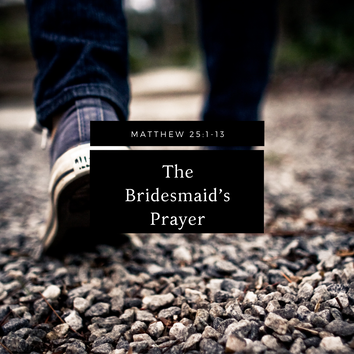 Bridegroom come soon ignite this life with fire pure desire remember this ember revamp my lamp train my ear your voice to hear grant me sight to see through night To the other end of this conversation where wrong’s made right the Lamb’s delight where angels praise before your holy blaze where the Word is heard and True Light is real sight until that day we wait we pray: Bridegroom come soon  Remember the iconic house lighting scene from National Lampoon’s Christmas Vacation (1989)? Clark Griswold, played by Chevy Chase, desperate for “a fun, old fashioned, family Christmas” has painstakingly decorated his house with 25,000 lights. He brings his family outside with much anticipation. It’s chilly out there. Clark’s father-in-law is…freezing. And then the unthinkable. The house doesn’t illuminate. “The little lights,” Art, played by E.G. Marshall, says, “they aren’t twinkling.” “I know, Art. Thanks for noticing.” Is it even Christmas without light? Certainly not for Clark. Is there even a wedding feast without light? Certainly not for the bridegroom. This is the third of four short advent readings from Matthew 25:1-13. The first two look forward to Christ’s second advent—the one that hasn’t happened yet. The final two look back to the first advent. Please take a moment to read the passage. It’s illuminating! Jesus says the kingdom of heaven will be like ten bridesmaids who took their lamps to meet the bridegroom. According to D.A. Carson in the New Bible Commentary, this is a village wedding where the bridesmaids are waiting to escort the groom and bride to the wedding feast. Five of the bridesmaids are prepared and five are not. Like Clark outside on that chilly Chicago night, the bridesmaids should have been ready to light it up. Perhaps they’re cold, obviously, they’re sleepy but the mood is still one of anticipation, readiness. But when the groom arrives—jubilantly, buoyantly, unexpectedly—sadly, the little lights, aren’t twinkling. Well, that’s not exactly true. Half of the lamplights cut through the night brilliantly, like Clark’s house eventually does. And as it turns out, half the light is all the bridegroom needs. In John’s Gospel, we learn that Jesus is the creating, sustaining Word of God who is also the light and life of humanity. Jesus is Godlight that darkness cannot comprehend, appropriate, absorb or overpower. The darkness is thick and unreceptive—but still Jesus comes as heaven’s light to ignite ready lamps. Clark needed 25,000 lights. This Christmas, we only need one. Though the night is long and cold, though we grow weary of waiting, let’s stay ready to light our little lamps from the Light of lights, the Flame of flames, by faith. Let’s rejoice and sing and be merry in the revelation the True Light brings. May it never be said of us, at Christmas or any other time of year, that little light, she’s not twinkling. Shine! Finish Well, Dionne |
Dionne"Lay aside every weight and the sin that so easily entangles and run with endurance the race set before you. " Archives
June 2023
Categories |

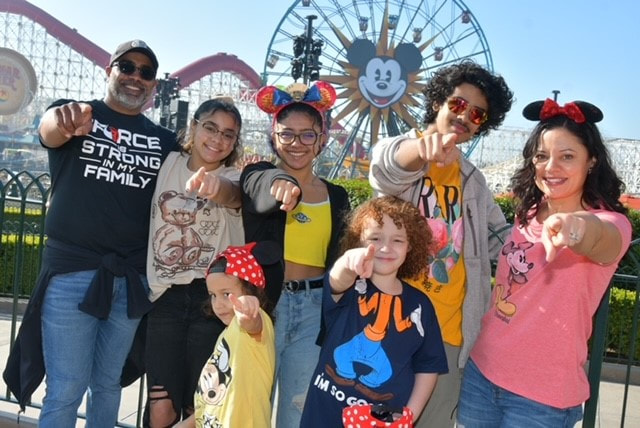

 RSS Feed
RSS Feed